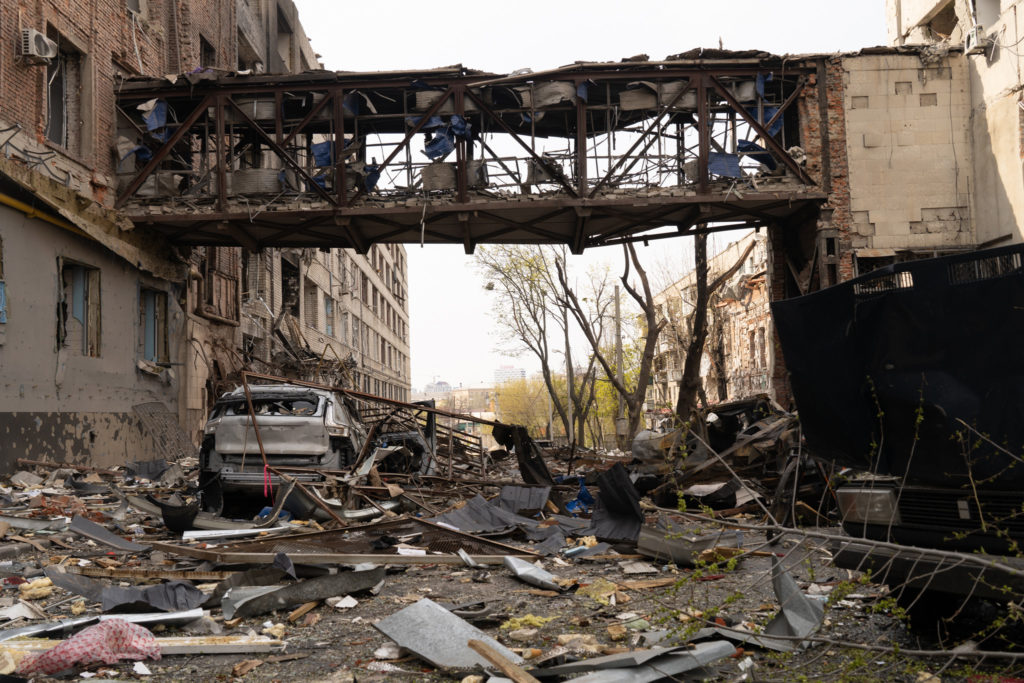
When Russian President Vladimir Putin appeared on television to announce a military operation in Ukraine, Bennett Murray ’12 was in the heart of Russia surrounded by the stunning vistas of its Altai Republic.
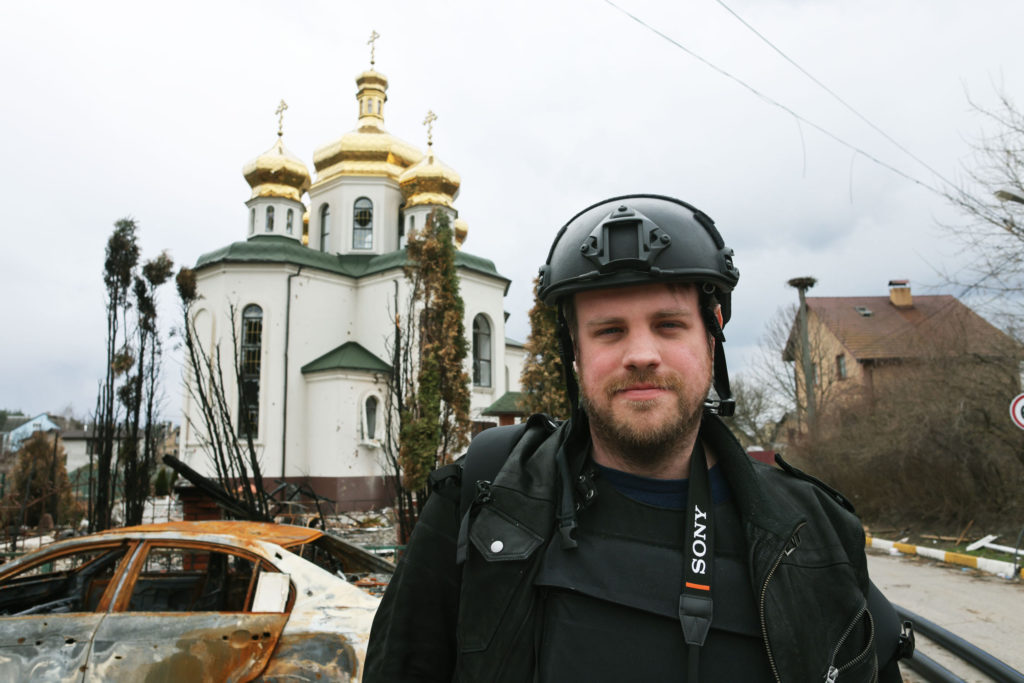
After war disrupted his journalism fellowship in Russia, Bennett Murray ’12 spent 90 days on the ground in a defiant Ukraine.
Murray was in Russia as an Alfa Fellow, an international professional development program for those from the United States, Germany and England. He was planning to spend a full year polishing his Russian and working as a reporter for The Moscow Times, the next step in his career as an international journalist.
Nestled in the Altai mountains, he and other Alfa Fellows were in one of the most peaceful and beautiful parts of the world, but they knew that all of their plans had been shattered.
“We were all just numb and in shock trying to figure out what was going to happen to us,” Murray said of the moment. The day following Putin’s invasion on Feb. 24, the program was suspended indefinitely and each Fellow boarded a plane ticket on a flight to Turkey. They would spend the night in Istanbul and go their separate ways in the morning.
Instead of returning home to rural Maryland where he was living prior to the fellowship, Murray followed his heart and booked airfare to Warsaw, Poland, with plans to enter Ukraine as a freelance journalist where he had spent a year previously studying Russian at the Novamova language school in Kyiv.
Beginning March 5, Murray spent the next 90 days in Ukraine, the maximum time allowable without a visa. He covered key aspects of the war in the cities of Kyiv and Kharkiv, and finished his time in the Donbas region where the fighting originated.
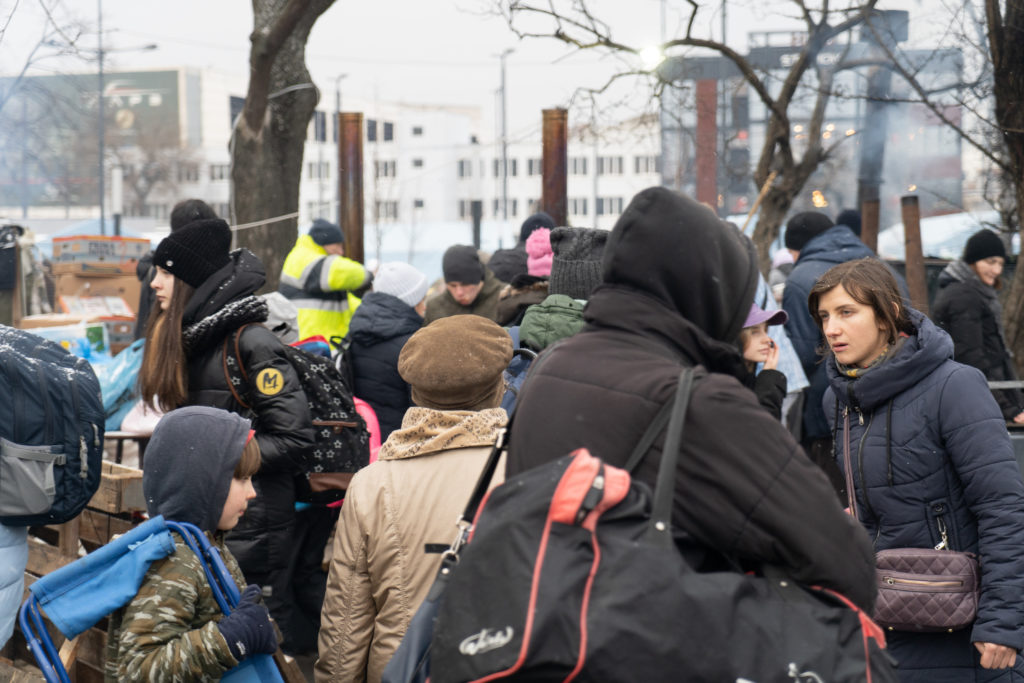
“I knew people whose lives were being torn apart,” he said. “I felt morally obliged to go, and I knew I would regret it if I didn’t.
“I felt like I had to stand shoulder to shoulder with my friends in Ukraine—in Ukraine.”
Murray spent his early career as a journalist working for tourism publications and international newspapers in Cambodia and Vietnam. There was plenty of charm and even a little comfort and orderliness in his travels. This was different.
Before leaving Warsaw, Murray bought camera equipment, clothes and a sleeping bag in case his travels took him to bomb shelters. And each day before leaving for Ukraine he withdrew the maximum amount of money he could from ATMs, not knowing what access he would have to his bank accounts. He then boarded a train to the border city of Lviv, passing hordes of refugees fleeing the country in the opposite direction.
“I sort of started from scratch in some ways,” Murray said in April from a hotel in Kyiv just af-ter the bombing had stopped and Russian forces retreated. “I came here at first hoping to use my contacts but it took me a few weeks to get to the point where I could be useful every day.”
Telling the stories of everyday heroes
Murray began documenting the spirit of resistance. One of his stories, for example, marked the 50 day-anniversary for a group of Ukrainians living underground in the Studentska metro station instead of fleeing for safety.
“You see a lot of courage here amid unfathomable atrocities and war crimes,” he said. “I would talk to middle-class people who have the means to leave but choose not to, people who volunteer to deliver supplies, to people coming out of retirement to serve as paramedics. The everyday courage is inspiring.”
Murray also set his sights on finding unsung heroes, including 26-year-old Svitlana Dolbysheva, a web designer living in a basement in Kyiv who built anti-tank traps and armor plates for soldiers on the frontlines.
“Maybe it’s good that people who were really scared moved out, because then the people who left are stronger,” Dolbysheva told Murray for a story in the Sunday Post, a popular weekly newspaper in Scotland. “Maybe in war conditions, that’s the most important thing.”
In addition to the Sunday Post, Murray’s stories, radio and television dispatches have appeared in the New Internationalist, CNN and the British Broadcasting Corporation. He also publishes a weekly newsletter at 1991dispatch.substack.com.
“The editors I write for want you to tell them what’s happening— I’m a civilian at war myself— because they don’t necessarily know what’s happening,” Murray said. “You try to tell them what they should care about.”
More than 3,000 civilians have been killed during the invasion according to the United Nations, and at least seven journalists have died covering the war, according to the Committee to Protect Journalists. At first, Murray largely felt safe on the ground despite the menacing ugliness of the war.
“Minute by minute I was safe in Kyiv,” Murray said of the Russian attack which reached the capital city on the first day of the war. “I just heard the air raid sirens going off and explo-sions off in the distance. Even as some missile strikes were getting closer to the city center, I still felt like I was safe. If the Russian missile kills you, or part of a piece of a bomb falls on top of you from being shot down by air defense system, you’re still the unluckiest guy. It didn’t feel super dangerous after a while.”
As he moved east to Kharkiv, the situation grew grimmer. “It’s been a lot more violent overall, more of the city is visibly damaged,” he said from a studio apartment he rented in the city. “It’s more explosive, but fortunately I don’t feel like I’m in mortal peril all of the time.”
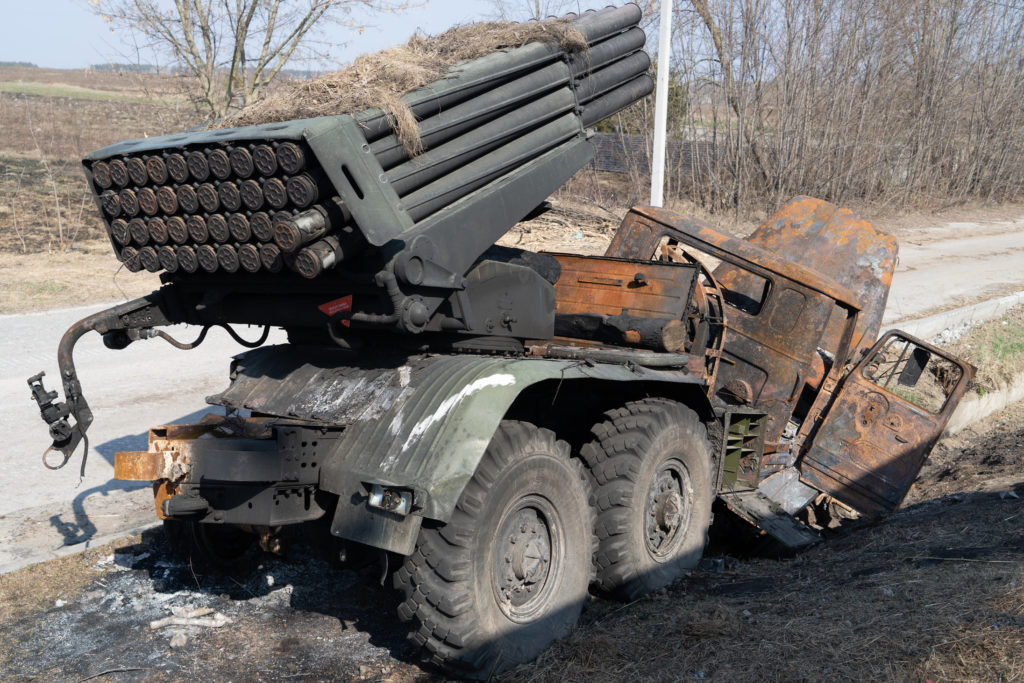
“I would talk to middle-class people who have the means to leave but choose not to, people who volunteer to deliver supplies, to peoplecoming out of retirement to serve as paramedics. The every day courage is inspiring.”
Testing his Quaker upbringing
Murray comes from a family of Quakers, but it wasn’t until he met an Earlhamite counselor while at the Baltimore Yearly Meeting’s Teen Adventure Camp program that he turned his sights to Earlham.
He arrived on campus in 2007 and completed a major in history and a minor in journalism, spending much of his spare time writing for the Earlham Word, the student newspaper. He counts Tom Hamm, professor of history and Quaker scholar in residence; Judi Hetrick, a former visiting assistant professor of journalism; and Chuck Yates, professor emeritus of history; as early mentors in his education and pursuit of a career in writing.
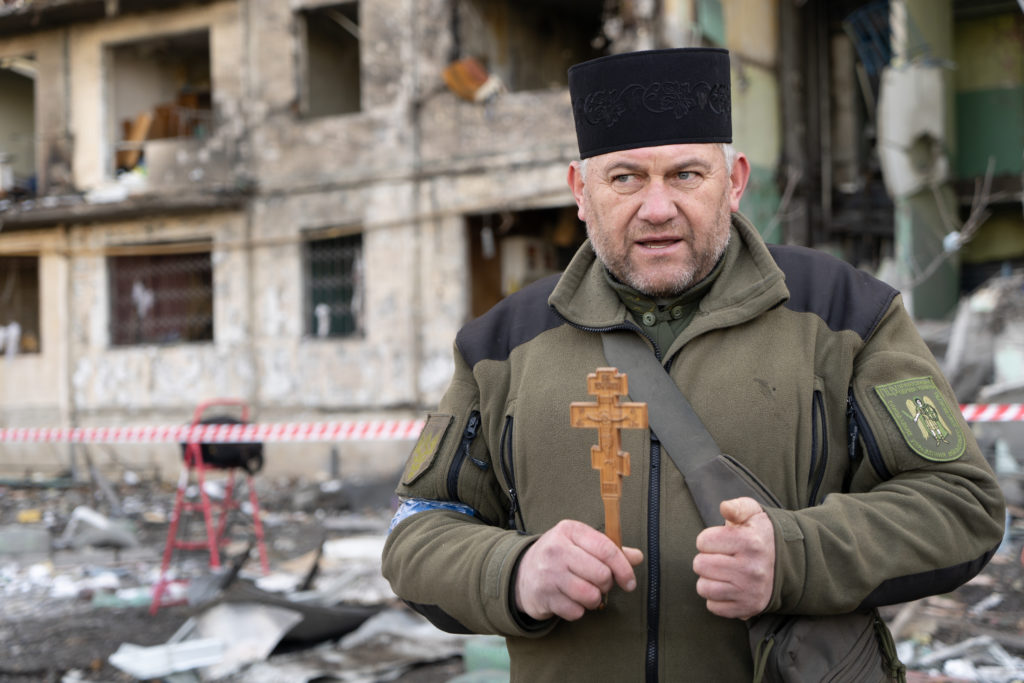
“Having that newspaper on campus was really important to my overall experience at Earlham, and my career,” Murray said.
His career was also shaped by an international internship and by deeply studying how Quakers understood war. During his years as a student, he took the year of 2009 to travel to Cambodia and was an intern at The Phnom Penh Post to fulfill his graduation requirements. When he returned to campus the following year, he rounded out his undergraduate education by writing a thesis on the sectarian differences of Ohio Quakers during the Civil War.
As a history major, Murray said it has been impossible not to compare the Russian invasion of Ukraine with World War II.
“This isn’t a profound observation, nor am I the first to make it, but certainly there are parallels between the German invasion of the Soviet Union and the Russian invasion of Ukraine. It’s something that the people here are aware of. There are people old enough here who remember World War II.
“It must be devasting to have early memories of the Nazis and now, in your twilight years, facing another invasion. Things have come full circle in the darkest ways possible.”
Murray knows that after his 90 days that he will be leaving the war. He also knows that it will stay with him.
“It is interesting being in a war situation, with bombs falling around you, and coming from a pacificist background. I hope people see that Ukraine is facing an aggressor that is brutalizing the place,” Murray said. “The emotions, the sights, the terrible suffering and war crimes, it will stick with me in one way or another.
“It’s so hard to know what impact this will have on me when I go back to a more stable situation in life,” he said. “I’m not trying to think too much about it and just live in the moment. One thing I know is that I’ll never look at war, or news coverage the same way again.
Story written by Brian Zimmerman. Photos by Stanton Sharpe and Bennett Murray ’12.
Like what you’ve read? Share this article with your network.